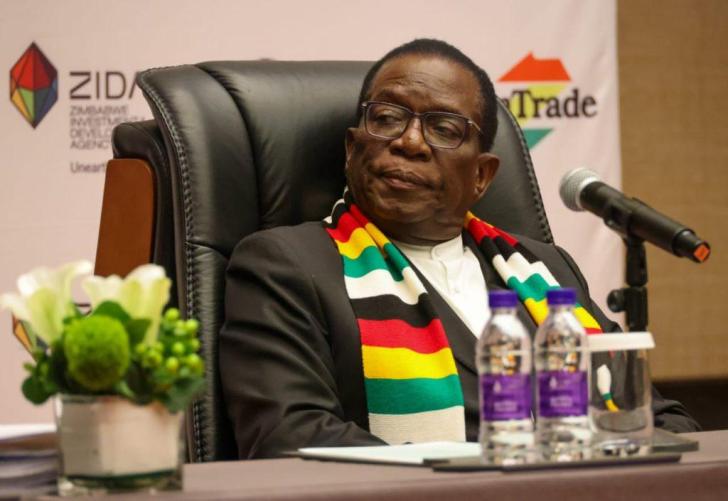News / National
Mnangagwa says mineral-rich countries must not remain poor
14 Nov 2024 at 09:24hrs |
0 Views

As the world transitions toward renewable energy, Zimbabwe and other mineral-rich nations must not remain impoverished but should harness opportunities to drive sustainable growth, President Emmerson Mnangagwa has asserted. Speaking at a High-Level Meeting on Resourcing the Energy Transition with Justice and Equity, convened by UN Secretary-General António Guterres at COP29, President Mnangagwa emphasized the importance of ensuring that mineral-rich countries benefit equitably in the global shift toward greener technologies.
With the growing demand for transition minerals—essential for renewable energy and sustainable technology—President Mnangagwa stressed the need for a "just energy transition" that avoids past inequalities, where resource-rich nations were primarily suppliers of raw materials without reaping the full economic benefits.
"A situation where mineral-rich countries remain in perpetual poverty and mere suppliers of raw materials and net importers of value-added, expensive technologies and goods is no longer acceptable," he stated.
President Mnangagwa, who also serves as the chairman of the Southern African Development Community (SADC), called for a balanced approach that respects the intrinsic value of these mineral-rich countries and recognizes their role in the renewable energy sector. Zimbabwe, home to significant reserves of lithium, platinum group minerals (PGMs), graphite, and copper, has implemented policies to shift from raw material exportation to active participation in the renewable technology value chain, prioritizing local beneficiation, technology transfer, and fair revenue distribution.
"Zimbabwe has put in place measures to transform our economy from a supplier of raw materials to a critical player in the renewable energy technology value chain," President Mnangagwa said. "We are determined to build more green jobs, particularly for women and youth, while fostering sustainable industrialization and economic diversification."
The President highlighted Zimbabwe's initiatives to encourage in-country beneficiation and value addition for critical minerals, attracting investment in processing facilities. This includes a Mines-to-Energy Park currently under development, which will feature facilities for refining PGMs, processing lithium carbonate, and manufacturing batteries.
In alignment with Zimbabwe's sustainable ambitions, President Mnangagwa invited investors to partner in expanding the country's energy mix, with a focus on floating solar parks, wind energy, and broader renewable energy projects. He also underscored the importance of building sustainable logistics and export capabilities that would support the Southern Africa region in achieving a just energy transition.
Zimbabwe's government has prioritized renewable innovation, establishing hubs for energy technology at universities and colleges across the country. These innovation hubs are designed to propel Zimbabwe into a leading role in green technology development.
President Mnangagwa further pledged Zimbabwe's support for the Secretary-General's Panel on Critical Energy Transition Minerals and the principles outlined to promote responsible resource use, aligning them with Zimbabwe's Responsible Mining Initiative launched in 2023.
"These align with our country's national development priorities and Vision 2030, towards a prosperous and empowered middle-income society, driven by people-centered policies," President Mnangagwa added.
UN Secretary-General António Guterres echoed the potential benefits for resource-rich developing nations, emphasizing the role of these minerals in achieving global renewables capacity targets by 2030.
"For developing countries rich in those resources, this is a huge opportunity to generate prosperity, eliminate poverty, and drive sustainable development," Mr. Guterres stated.
Zimbabwe's proactive stance at COP29 underscores its dedication to ensuring that Africa's critical minerals contribute not only to the global green energy transition but also to long-term economic upliftment and justice for resource-endowed nations.
With the growing demand for transition minerals—essential for renewable energy and sustainable technology—President Mnangagwa stressed the need for a "just energy transition" that avoids past inequalities, where resource-rich nations were primarily suppliers of raw materials without reaping the full economic benefits.
"A situation where mineral-rich countries remain in perpetual poverty and mere suppliers of raw materials and net importers of value-added, expensive technologies and goods is no longer acceptable," he stated.
President Mnangagwa, who also serves as the chairman of the Southern African Development Community (SADC), called for a balanced approach that respects the intrinsic value of these mineral-rich countries and recognizes their role in the renewable energy sector. Zimbabwe, home to significant reserves of lithium, platinum group minerals (PGMs), graphite, and copper, has implemented policies to shift from raw material exportation to active participation in the renewable technology value chain, prioritizing local beneficiation, technology transfer, and fair revenue distribution.
"Zimbabwe has put in place measures to transform our economy from a supplier of raw materials to a critical player in the renewable energy technology value chain," President Mnangagwa said. "We are determined to build more green jobs, particularly for women and youth, while fostering sustainable industrialization and economic diversification."
The President highlighted Zimbabwe's initiatives to encourage in-country beneficiation and value addition for critical minerals, attracting investment in processing facilities. This includes a Mines-to-Energy Park currently under development, which will feature facilities for refining PGMs, processing lithium carbonate, and manufacturing batteries.
Zimbabwe's government has prioritized renewable innovation, establishing hubs for energy technology at universities and colleges across the country. These innovation hubs are designed to propel Zimbabwe into a leading role in green technology development.
President Mnangagwa further pledged Zimbabwe's support for the Secretary-General's Panel on Critical Energy Transition Minerals and the principles outlined to promote responsible resource use, aligning them with Zimbabwe's Responsible Mining Initiative launched in 2023.
"These align with our country's national development priorities and Vision 2030, towards a prosperous and empowered middle-income society, driven by people-centered policies," President Mnangagwa added.
UN Secretary-General António Guterres echoed the potential benefits for resource-rich developing nations, emphasizing the role of these minerals in achieving global renewables capacity targets by 2030.
"For developing countries rich in those resources, this is a huge opportunity to generate prosperity, eliminate poverty, and drive sustainable development," Mr. Guterres stated.
Zimbabwe's proactive stance at COP29 underscores its dedication to ensuring that Africa's critical minerals contribute not only to the global green energy transition but also to long-term economic upliftment and justice for resource-endowed nations.
Source - The Herald
Join the discussion
Loading comments…




































